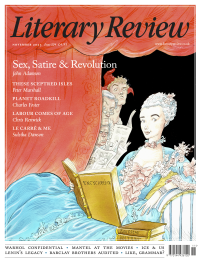Joe Moran
From Cringe to Binge
Pandora’s Box: The Greed, Lust, and Lies That Broke Television
By Peter Biskind
Allen Lane 400pp £25
According to Peter Biskind, we have been living for the last two decades in the era of ‘peak TV’. From The Sopranos to Succession, television shows have become subtler and more intellectually and emotionally rich than ever before. Pandora’s Box is about this revolution in programme-making, begun by cable channels such as HBO and Showtime and completed by streaming services such as Netflix and Amazon Prime. Freed from the constraints imposed by the US national networks, these platforms have been able to develop shows of enormous sweep and depth. For Biskind, this has ‘propelled TV into shouting distance of the great nineteenth-century novels’.
Whereas writers in Hollywood are treated appallingly, in the world of peak TV they are accorded their true worth. Most two-hour feature films feel psychologically thin when set against the intricacies of much TV drama. Contemporary movies, in the words of the filmmaker David Fincher, lean towards ‘physics porn’, being more concerned with video-game-style special effects than patiently building character. On TV, even in big-budget epics like Game of Thrones, spectacle gives way to emotional weight. When Martin Scorsese read Terence Winter’s scripts for the HBO series Boardwalk Empire, he said, ‘This is great. You get to see what happens to the characters after the movie is over.’
Pandora’s Box opens in the 1950s and 1960s, the peak era of sponsored, network TV, a terminally bland world of sitcoms, film reruns and undemanding quiz shows. The downside of programming being paid for solely by advertising was that television became ‘a measureless tract of hard, cracked soil,

Sign Up to our newsletter
Receive free articles, highlights from the archive, news, details of prizes, and much more.@Lit_Review
Follow Literary Review on Twitter
Twitter Feed
It wasn’t until 1825 that Pepys’s diary became available for the first time. How it was eventually decrypted and published is a story of subterfuge and duplicity.
Kate Loveman tells the tale.
Kate Loveman - Publishing Pepys
Kate Loveman: Publishing Pepys
literaryreview.co.uk
Arthur Christopher Benson was a pillar of the Edwardian establishment. He was supremely well connected. As his newly published diaries reveal, he was also riotously indiscreet.
Piers Brendon compares Benson’s journals to others from the 20th century.
Piers Brendon - Land of Dopes & Tories
Piers Brendon: Land of Dopes & Tories - The Benson Diaries: Selections from the Diary of Arthur Christopher Benson by Eamon Duffy & Ronald Hyam (edd)
literaryreview.co.uk
Of the siblings Gwen and Augustus John, it is Augustus who has commanded most attention from collectors and connoisseurs.
Was he really the finer artist, asks Tanya Harrod, or is it time Gwen emerged from her brother’s shadow?
Tanya Harrod - Cut from the Same Canvas
Tanya Harrod: Cut from the Same Canvas - Artists, Siblings, Visionaries: The Lives and Loves of Gwen and Augustus John by Judith Mackrell
literaryreview.co.uk